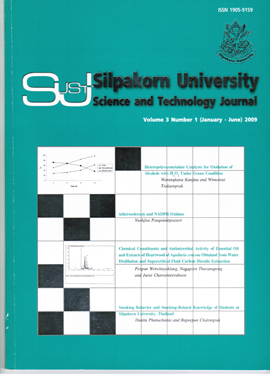Chemical Constituents and Antimicrobial Activity of Essential Oil and Extracts of Heartwood of Aquilaria crassna Obtained from Water Distillation and Supercritical Fluid Carbon Dioxide Extraction
Main Article Content
Abstract
Agarwood (Aquilaria crassna) is a high value economic plant.Agarwood oil is widely used among variouscountries as perfumes and ingredient inmedical recipes. In this study, the extraction of driedAgarwood powderbywater distillation (WD), supercritical fluid carbon dioxide extraction (SFE) and SFEwith ethanol as cosolvent(SFE+co) gave 0.2%oil, 0.06%and 0.014%extracts, respectively. The types of chemical constituents of oil andextracts from these 3 extraction methods were quite similar. The major chemical constituents ofWD oil, SFEand SFE+co extracts were g-selinene (13.66%), selina-4,11-dien-14-al (14.25%) and selina-4,11-dien-14-al(13.39%), respectively. The WD oil, SFE and SFE+co extracts had antimicrobial activities against S. auruesand C. albicans, but were not sensitive to E. coli at maximum concentration of the study, 2mg/mL.
Downloads
Article Details
References
Adams, R. P. (2001). Identification of essential oil components by gas chromatography /quadrupole mass spectroscopy, Allured Publishing,, Carol Stream. IL.
Anklam, E., Berg, H., Mathiasson, L., Sharman, M., and Ulberth, F. (1998). Supercritical fliud extraction (SFE) in food analysis: A review.Food Additives and Contaminants, 15: 729-750.
Bunyapraphatsara, N., and Chokchaijareonporn, A. (1996). Sa-mund-phai Mai-pern-ban, .Prachachon Co., Bangrak, Bangkok.
El-Sayed, A. M. (2003). The Pherobase. [Online URL: www.pherobase.com/database/compound/compounds-index.php] accessed on September 12, 2008.
Giacomo, A. D., and Giacomo, G. D. (2002). Essential oil production. In Citrus: The Genus Citrus. Medicinal and Aromatic Plants-industrial Profiles; V. 26 (Giacomo, G. D. and Giacomo, A. D., eds.), pp. 114-147. Taylor & Francis, New York.
Ishihara, M. and Tsuneya, T. (1993a). Components of the Volatile Concentrate of Agarwood. Journal of Essential Oil Research, 5: 283-289.
Ishihara, M. and Tsuneya, T. (1993b). Components of the Agarwood Smoke on Heating. Journal of Essential Oil Research, 5: 419-423.
Poain, T. and Poain, N. (2001). Interested Medicinal Plants, Offset Press Ltd., Bangkok.
Prachakul, M. (1989). Histology Characteristic of Normal and Abnormal of Agarwood (Aquilaria crassna Pierre ex K. Lec.) Heartwood, Kasetsart University. Bangkaen. Bangkok.
Thitisomboon, P. (2006). Cultivated Krisana. Ten thousand Bath per Tree and Million Bath per Rai, M S H Printing Ltd., Yannawa. Bangkok.
Tamuli, P., Boruah, P., Nath, S. C., and Leclercq, P. (2005). Essential Oil of Eaglewood Tree a Product of Pathogenesis. Journal of Essential Oil Research, 17: 601-604.


